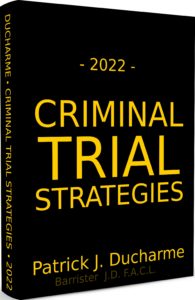A just outcome for accused persons and for victims of crime is the beacon of any fair society. Trial lawyers and judges are the defenders of liberty.
Strategy is most often studied in relation to sports, business and war. In sports, the consequence of poor strategy is the loss of pride. In business, the loss of money. In war, the loss of life and liberty. In fact, even a “good” strategy in war will result in the loss of life and liberty for many, as few military generals heed the most important strategic advice in Sun Tzu’s The Art of War: “Win all, without fighting”.
There is no aspect of life where strategy is more important to a person than in a criminal trial. For the individuals involved, the stakes are as high as in a war. A single strategic error on the part of a prosecutor or criminal defence counsel can destroy the life and liberty of the innocent, as well as their families and friends. And because of precedence, it can also affect an infinite number of citizens later. Trying a criminal case is therefore among the most stressful work that can be undertaken.
In law, every word is important. But some words are more important. Developing an effective trial strategy means knowing which words are the most important. This book will help you cut through the fluff. If you read it and understand it, you will be better equipped to navigate through complicated issues to a successful outcome.
Ineffective trial counsel will stumble and fail. With poor strategy, they will focus on irrelevant details, getting lost in the proverbial forest, blinded by the trees.
Effective trial counsel must stay focused on the most important facts. With a clear map of the overall case he or she must paint an accurate picture of the client’s story to the Judge or jury.
In planning an effective trial, counsel begins by preparing the ‘trial brief’, a collection of materials that are essential to conduct the trial. The brief must contain the indictment; the “will say” statements of all relevant witnesses, every important document, photograph and potential exhibits, and all relevant statutory law and case law.
The brief is a constant reminder to counsel that every question asked, every suggestion put to a witness in cross-examination, and every argument during the trial, must fit into and enhance the overall game plan.
The game plan supports the questions asked and suggestions made to witnesses, just as it fuels the legal arguments, final submissions and jury addresses.
The goal is that at the end of the trial, the effective counsel has painted a clear picture that persuades a Judge or jury to accept it and rely upon it for its decision.
This is a powerful book. May it only be used for the greater good and not for iniquity or to malign. Long live Justice for all.
The above is the Introduction to Criminal Trial Strategies, available at Amazon or in bulk through MedicaLegal Publishing.

